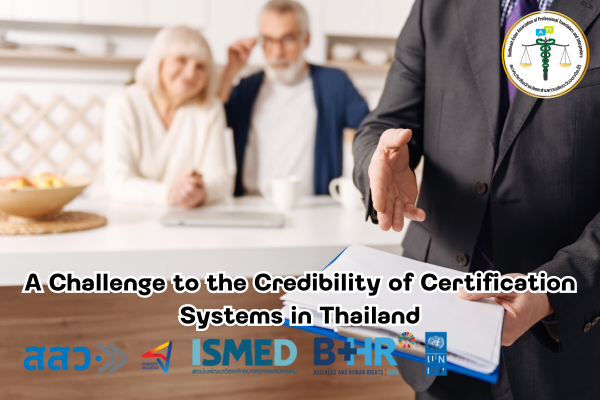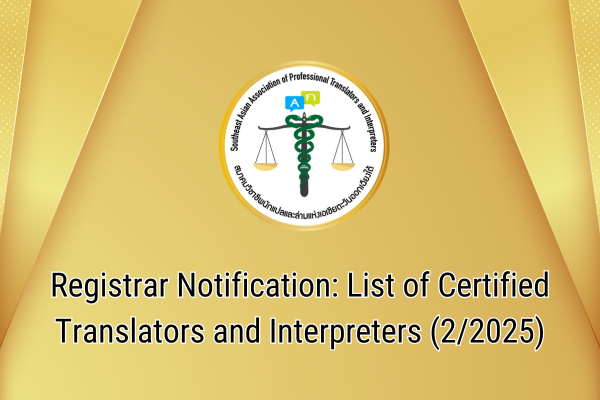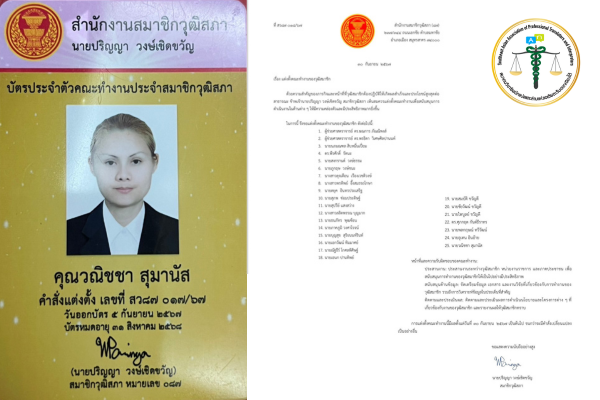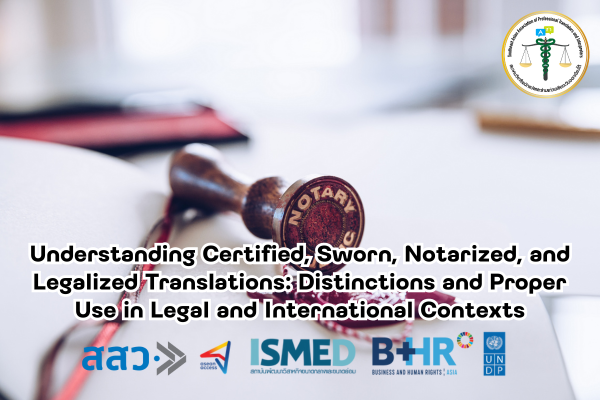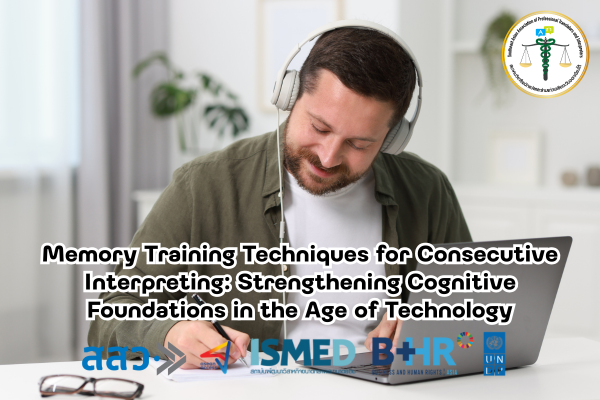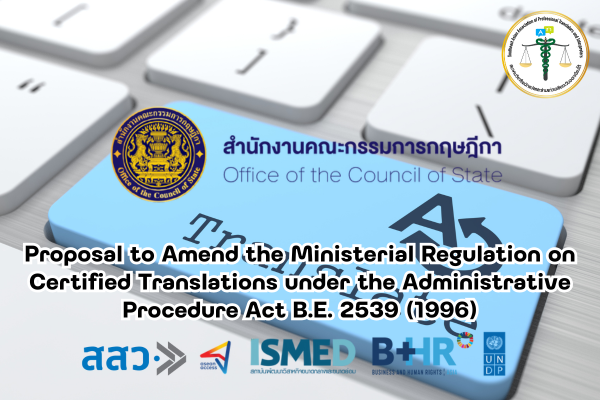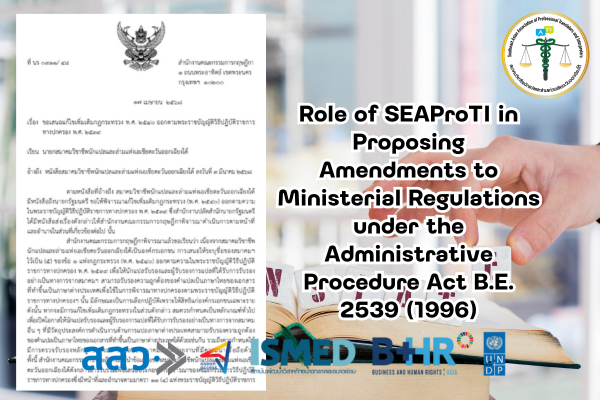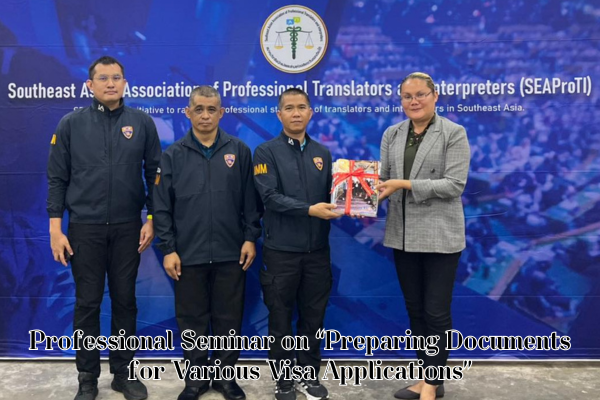“Lowering the Bar” and “Inconsistent Standards” in the Translation and Interpreting Profession:
A Challenge to the Credibility of Certification Systems in Thailand
15 April 2025, Bangkok – In today’s era of globalization and increasing cross-border mobility, translators and interpreters have become strategic agents in justice systems, national security, and equitable access to rights. However, in Thailand, there is growing concern over the phenomenon of “lowering the bar” and “inconsistent standards” among certified professionals, including those accredited by the Southeast Asian Association of Professional Translators and Interpreters (SEAProTI). This phenomenon not only reflects systemic issues but also poses a serious threat to public trust in the profession’s integrity.
1. Definitions: “Lowering the Bar” and “Inconsistent Standards” in Practice
“Lowering the bar” refers to the relaxation of clearly defined professional criteria, such as language proficiency requirements or training benchmarks, often in response to individual or institutional pressure. “Inconsistent standards” describe situations where certified professionals do not perform in the field at the level demonstrated during certification exams or training, leading to variable and often inadequate service quality. Examples include the use of general vocabulary in highly specialized contexts or failure to adjust language registers to match social and legal contexts.
2. Real-world examples of Professional Lapses
A common issue is the request by teachers or trainers to reduce the minimum required IELTS score from 7.0 to 6.0 or 6.5, claiming that most individuals cannot meet the higher standard. However, the benchmark of IELTS 7.0 exists precisely because scores below that level indicate an inability to fully comprehend spoken information—thus leading to interpretation errors. These errors, when made in legal or medical settings, can have life-threatening consequences.
Another example is an interpreter rendering testimony from a layperson in overly formal, academic language—essentially “translating” the person’s words into the voice of someone with an Oxford PhD. Such distortions can misrepresent facts in legal proceedings and unfairly influence outcomes.
3. SEAProTI’s Measures to Uphold Professional Standards
SEAProTI has designed its certification system around two key principles: consistency and credibility. Certification is not the end of a professional’s obligations but the beginning of a continuous commitment to quality. When cases of non-compliance or substandard performance arise, SEAProTI may:
- Require re-assessment of certified professionals
- Issue formal warnings or suspend certification
- Revoke certification in serious cases that compromise public interest
These mechanisms affirm SEAProTI’s commitment to ongoing professional accountability, not just initial qualification.
4. Lessons from the Thai Industrial Standards Institute (TISI) and the Auditor General’s Building Collapse
The collapse of the Auditor General’s office building in Thailand is a striking reminder of the dangers of inconsistent standards. Investigations revealed discrepancies between the quality of materials submitted for inspection and those used in actual construction. In the same way, professional standards cannot exist solely on paper. Translators and interpreters must maintain their certified competencies in real-world practice; failure to do so undermines the profession and harms those who rely on it.
5. Recommendations for Maintaining Professional Integrity
- Do not compromise fundamental standards in the name of flexibility, especially when public rights or safety are at stake.
- Promote continuous professional development (CPD) to ensure professionals do not stagnate after certification.
- Implement field-based performance evaluations to verify the consistent application of skills in actual assignments.
- Foster professional pride and ethical awareness by reinforcing that standards are societal obligations, not just administrative requirements.
Conclusion
Maintaining professional standards in translation and interpreting is not simply a matter of test scores or credentials. It requires consistency, accuracy, and ethical conduct in the field. Arbitrarily lowering standards or bending them to accommodate individual limitations endangers the public and weakens the profession as a whole. SEAProTI firmly upholds that international benchmarks—such as a minimum IELTS score of 7—must remain in place, and professionals should rise to meet these standards rather than expecting them to be lowered.
If “lowering the bar” becomes normalized, it is not just the profession that will suffer. The ultimate cost will be borne by the people—those who rely on our words to access justice, healthcare, security, and dignity.
SEAProTI’s certified translators, translation certification providers, and certified interpreters:
The Southeast Asian Association of Professional Translators and Interpreters (SEAProTI) has officially announced the criteria and qualifications for individuals to register as “Certified Translators,” “Translation Certification Providers,” and “Certified Interpreters” under the association’s regulations. These guidelines are detailed in Sections 9 and 10 of the Royal Thai Government Gazette, issued by the Secretariat of the Cabinet under the Office of the Prime Minister of the Kingdom of Thailand, dated July 25, 2024, Volume 141, Part 66 Ng, Page 100.
To read the full publication, visit: the Royal Thai Government Gazette
“การลดสเป็ค” และ “มาตรฐานไม่สม่ำเสมอ” ในวิชาชีพการแปลและล่าม:
ความท้าทายต่อความน่าเชื่อถือของระบบรับรองในประเทศไทย
15 เมษายน 2568, กรุงเทพมหานคร – ในยุคที่โลกาภิวัตน์และการเคลื่อนไหวของผู้คนข้ามพรมแดนเพิ่มมากขึ้นอย่างต่อเนื่อง บทบาทของนักแปลและล่ามกลายเป็นสิ่งที่มีความสำคัญเชิงยุทธศาสตร์ต่อทั้งกระบวนการยุติธรรม ความมั่นคงของรัฐ และความเท่าเทียมในการเข้าถึงสิทธิของประชาชน อย่างไรก็ตาม ในประเทศไทยกลับปรากฏข้อเท็จจริงที่น่ากังวลเกี่ยวกับ “การลดสเป็ค” และ “มาตรฐานไม่สม่ำเสมอ” ในหมู่นักวิชาชีพที่ได้รับการรับรองอย่างเป็นทางการจากองค์กรวิชาชีพ เช่น สมาคมวิชาชีพนักแปลและล่ามแห่งเอเชียตะวันออกเฉียงใต้ (SEAProTI) ปรากฏการณ์นี้ไม่เพียงสะท้อนถึงปัญหาเชิงระบบ หากแต่ยังท้าทายต่อความศรัทธาของสาธารณชนต่อมาตรฐานของวิชาชีพด้วย
1. ความหมายของ “การลดสเป็ค” และ “มาตรฐานไม่สม่ำเสมอ” ในวิชาชีพ
“การลดสเป็ค” หมายถึง การลดทอนเกณฑ์มาตรฐานที่เคยถูกกำหนดไว้อย่างชัดเจน เช่น การลดคะแนนสอบภาษา การผ่อนผันหลักสูตรการอบรม หรือการยืดหยุ่นเกณฑ์วิชาชีพเพื่อตอบสนองข้อเรียกร้องเฉพาะบุคคล ส่วน “มาตรฐานไม่สม่ำเสมอ” หมายถึง การที่ผู้ได้รับการรับรองดำเนินงานในภาคสนามด้วยคุณภาพที่ไม่เท่ากัน หรือไม่เป็นไปตามระดับความสามารถที่แสดงไว้ในระหว่างการสอบหรืออบรม เช่น ใช้ระดับภาษาที่ไม่เหมาะสมกับบริบท หรือแปลผิดเนื่องจากขาดความเข้าใจเนื้อหาต้นฉบับ
2. ตัวอย่างปัญหาที่พบในวิชาชีพการแปลและล่าม
ปัญหาดังกล่าวสามารถพบได้ทั้งในภาคการศึกษาและภาคปฏิบัติงาน เช่น กรณีครูอาจารย์ที่มีคะแนนสอบ IELTS ต่ำกว่าเกณฑ์ขั้นต่ำที่สมาคมกำหนด (IELTS ≥ 7) แต่ยังคงขอให้ลดระดับมาตรฐานลงโดยอ้างว่า “คนส่วนใหญ่ได้เพียง 6 – 6.5” ทั้งที่การลดเกณฑ์เช่นนี้นำไปสู่ความเสี่ยงต่อการแปลผิดเพราะไม่สามารถฟังหรือเข้าใจถ้อยคำได้อย่างถ่องแท้ หรือในอีกกรณีหนึ่ง ล่ามบางคนแปลถ้อยคำของพยานที่เป็นชาวบ้านด้วยภาษาทางการระดับสูงอย่างไม่เหมาะสม จนสะท้อนภาพที่ผิดจากข้อเท็จจริง อันอาจมีผลต่อคำพิพากษา
3. มาตรการของ SEAProTI ต่อการรักษามาตรฐาน
สมาคม SEAProTI ได้ออกแบบระบบการรับรองเพื่อยึดหลัก “ความสม่ำเสมอ” (Consistency) และ “ความน่าเชื่อถือ” (Credibility) โดยมีการสอบคัดกรอง การอบรมตามมาตรฐาน และการควบคุมคุณภาพอย่างต่อเนื่อง อย่างไรก็ตาม เมื่อพบกรณีที่นักวิชาชีพไม่รักษามาตรฐาน สมาคมมีแนวทางการดำเนินการดังนี้
- เรียกประเมินซ้ำ (Reassessment)
- ออกคำเตือนหรือระงับสิทธิชั่วคราว
- เพิกถอนใบรับรองหากพบว่าการกระทำส่งผลเสียหายต่อสาธารณะ
แนวทางเหล่านี้สะท้อนให้เห็นว่าสมาคมไม่เพียงให้การรับรองแล้วจบ หากแต่ให้ความสำคัญกับ “ความรับผิดชอบต่อเนื่อง” ของนักวิชาชีพในทุกบริบท
4. บทเรียนจากมาตรฐาน มอก. และกรณีตึกถล่ม
กรณีอาคารสำนักงานการตรวจเงินแผ่นดิน (สตง.) ถล่ม เป็นบทเรียนสำคัญเกี่ยวกับ “มาตรฐานที่ไม่สม่ำเสมอ” ซึ่งเกิดจากการผลิตที่ไม่สอดคล้องกับเกณฑ์ที่ส่งตรวจ การมีมาตรฐานบนกระดาษจึงไม่เพียงพอหากไม่มีการตรวจสอบคุณภาพในการนำไปใช้จริงในภาคสนาม ในทำนองเดียวกัน หากนักแปลและล่ามได้รับการรับรองแล้วไม่สามารถรักษามาตรฐานได้จริงในบริบทการทำงาน ย่อมทำให้ทั้งระบบวิชาชีพตกอยู่ในภาวะเสี่ยง และท้ายที่สุดคือผลกระทบที่ตกอยู่กับประชาชนผู้รับบริการ
5. ข้อเสนอเพื่อคงไว้ซึ่งมาตรฐานวิชาชีพ
ไม่ผ่อนผันเกณฑ์พื้นฐานในนามของความยืดหยุ่น – หากเกณฑ์นั้นเกี่ยวข้องกับความสามารถที่ส่งผลต่อชีวิตหรือสิทธิของบุคคล
- ส่งเสริมการพัฒนาวิชาชีพอย่างต่อเนื่อง (CPD) – นักวิชาชีพต้องไม่หยุดอยู่ที่การสอบผ่าน
- สร้างระบบประเมินภาคสนาม – เพื่อตรวจสอบว่านักวิชาชีพสามารถปฏิบัติงานได้ตามมาตรฐานในสถานการณ์จริง
- รณรงค์เรื่องศักดิ์ศรีของวิชาชีพ – เพื่อปลูกจิตสำนึกว่ามาตรฐานคือการรับผิดชอบต่อสังคม ไม่ใช่เพียง “คุณสมบัติ” บนกระดาษ
สรุปส่งท้าย
การรักษามาตรฐานในวิชาชีพการแปลและล่ามไม่ใช่เรื่องของคะแนนสอบหรือใบรับรองเพียงเท่านั้น แต่เป็นเรื่องของความสม่ำเสมอ ความแม่นยำ และจริยธรรมในการปฏิบัติงานจริง การลดสเป็คอย่างไม่สมเหตุสมผลหรือการผ่อนผันมาตรฐานเพื่ออำนวยความสะดวกเฉพาะบุคคล คือการบ่อนทำลายโครงสร้างวิชาชีพโดยรวม สมาคม SEAProTI ยืนยันว่ามาตรฐานจะต้องสะท้อนความเป็นสากล มิใช่ถูกบีบให้สอดคล้องกับข้อจำกัดเฉพาะของแต่ละบุคคล นักวิชาชีพจำเป็นต้องยกระดับตนเองให้ถึงเกณฑ์ ไม่ใช่ลดเกณฑ์ให้ตรงกับตนเอง
หากปล่อยให้การลดสเป็คกลายเป็นเรื่องปกติ ความเสียหายจะไม่ตกอยู่ที่ใครอื่นนอกจากประชาชนผู้พึ่งพาวิชาชีพของเราเป็นสะพานเชื่อมการสื่อสาร ความเข้าใจ และความยุติธรรม
เกี่ยวกับนักแปลรับรอง ผู้รับรองการแปล และล่ามรับรองของสมาคมวิชาชีพนักแปลและล่ามแห่งเอเชียตะวันออกเฉียงใต้
สมาคมวิชาชีพนักแปลและล่ามแห่งเอเชียตะวันออกเฉียงใต้ (SEAProTI) ได้ประกาศหลักเกณฑ์และคุณสมบัติผู้ที่ขึ้นทะเบียนเป็น “นักแปลรับรอง (Certified Translators) และผู้รับรองการแปล (Translation Certification Providers) และล่ามรับรอง (Certified Interpreters)” ของสมาคม หมวดที่ 9 และหมวดที่ 10 ในราชกิจจานุเบกษา ของสำนักเลขาธิการคณะรัฐมนตรี ในสำนักนายกรัฐมนตรี แห่งราชอาณาจักรไทย ลงวันที่ 25 ก.ค. 2567 เล่มที่ 141 ตอนที่ 66 ง หน้า 100 อ่านฉบับเต็มได้ที่: นักแปลรับรอง ผู้รับรองการแปล และล่ามรับรอง


